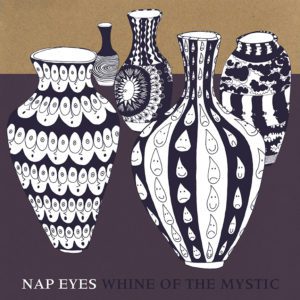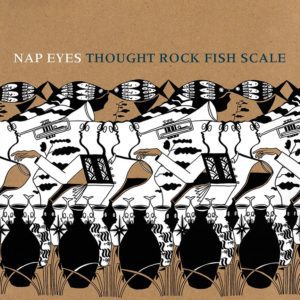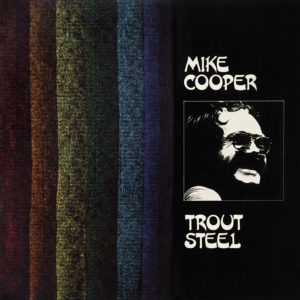First-ever reissue of folk and experimental music icon Mike Cooper’s historic earliest recordings and PoB’s very first Record Store Day exclusive release. Named for The Shades, the Reading, UK folk club where Mike Cooper regularly performed, and which housed prodigy Derek Hall—“a guitarist who could actually match Davey Graham both in technique and musical ideas” —this super rare EP was issued in 1965.
Highlights
- First-ever reissue of Cooper’s rare first recordings and PoB’s first Record Store Day exclusive release.
- RIYL Mike Cooper, Michael Chapman, Jackson C. Frank, Davey Graham, Bert Jansch, John Renbourn, Wizz Jones, or Clive Palmer.
- Available on virgin vinyl as a limited-edition 45 rpm 7”, with heavy-duty color jacket, restored original artwork, and notes; or as digital album.
- Purchases directly from this website include an immediate 320k MP3 download of the entire album; 7″ does not include a download card.
Tracklist
A1. “Paul’s Song” 3.20
A2. “Darlin’” 2.33
B1. “Livin’ with the Blues” 2.57
B2. “Skillet” 2.51
Catalog Number/Release Date
PoB-025 / April 16, 2016
Purchase from PoB above or support via
- Bandcamp (LP/CD/digital)
- Other Options (LP/CD/digital/streaming)
- Local Record Stores
More from Mike Cooper, Mike Cooper & Derek Hall, Various Artists
-

Brendan Greaves: Truckload of Art: The Life and Work of Terry Allen – An Authorized Biography
$34.00
Mike Cooper: Life and Death in Paradise + Milan Live Acoustic 2018
$11.00 – $27.00
The Weather Station & Jennifer Castle: Collaboration Session #3
$2.00 – $4.00
Bonnie “Prince” Billy & Nathan Salsburg: Untitled (“Beargrass Song” + 2 EP)
$4.00 – $12.00Sale!
Mike Cooper & Derek Hall: Out of the Shades
$2.00 – $4.00
James Elkington and Nathan Salsburg: Ambsace
$9.00 – $29.00Weight N/A FORMAT Album Narrative
In 2014 Paradise of Bachelors reissued iconoclastic English-born, Rome-based folk and experimental music legend Mike Cooper’s classic triptych of early 1970s avant-folk-rock records—Trout Steel (1970) and Places I Know/The Machine Gun Co. with Mike Cooper (1971-72)—to widespread critical acclaim, including Best New Reissue recognition from Pitchfork and Rolling Stone. But Cooper sowed the seeds of his deconstructivist music five years earlier in his rare earliest recordings, until now scarcely known and never reissued—fitting fodder for PoB’s very first Record Store Day release.
Named for The Shades, the Reading, UK folk club where he regularly performed, and which employed and housed guitar prodigy Derek Hall—who later played on Cooper’s 1969 debut LP Oh Really!?—the little-heard Out of the Shades EP was released in an extremely limited edition by local label Kennet Recordings in 1965 as KRS 766. The songs were recorded live to a single microphone in the kitchen/bathroom/former outhouse of Mike’s rambling Georgian apartment, on a portable Ferrograph reel-to-reel that the engineer otherwise used for “recording birds and trains.”
By 1965 Mike had already progressed beyond and exhausted his interest in electric Chicago blues with his first band The Blues Committee. He was now a peer of British folk scene stalwarts like Davey Graham, Wizz Jones, Bert Jansch, and John Renbourn, hosting folk nights up to five nights a week at venerable Reading and London clubs like Les Cousins, The Latin Quarter, The Elephant, and The Shades, Hall’s home base. Cooper recalls his former partner’s artistry and skill with fondness and wonder:
Derek was a phenomenal guitar player, incredible, and he could play all of Blind Blake’s stuff note-for-note. He could actually match Davey Graham both in technique and musical ideas. It was one of those weird things that happens from time to time whereby someone does something really incredible, and there’s someone else doing the same thing somewhere else, and they are not aware of one another. Derek and Davey were one of those cases.
On Out of the Shades you can hear the first, faint strains of Cooper’s restless reinvention of vernacular traditions, the ways in which his reverence for the Piedmont and country blues of the American South was showing subtle signs of fraying and unraveling into the tangles of more expansive improvisatory terrain. Cooper and Hall were still very much operating within the bounds of the British folk and blues revival, as you can hear on their masterful renderings of the traditional folk-blues numbers “Darlin’” (which Derek, who likely learned it from King of Skiffle Lonnie Donegan, performs solo) and “Livin’ with the Blues” (popularized by Sonny Terry and Brownie McGhee), classics populated by blind captains and drivin’ wheels.
Those songs form the inner core of the EP, but the two performances bookending the 45, inhabiting its outer and inner edges, demonstrate how the duo was pushing gently against the bounds of folk forms. “Paul’s Song,” an original written by Cooper and “local folkie” Paul Lucas, is reminiscent of the contemporaneous work of American expat Jackson C. Frank; it features a gorgeous, minor melody that in its brittle world-weariness belies Mike’s mere twenty-three years. The helical, cascading guitar part represents Cooper’s only playing on the EP (at this point, despite his prodigious talent on his trademark National resophonic, he considered himself primarily a vocalist, and here he mostly sings and plays harmonica.) The closer “Skillet,” sung beautifully by Cooper, utterly transforms Uncle Dave Macon’s 1924 recording of “Keep My Skillet Good and Greasy.” Hall’s woozy, note-bending vamping unspools the second half of the song into an extraordinary instrumental passage full of mercury and momentum. It’s a song about extreme appetites—cooking every hour, keeping Nancy “drunk and goosey all the time” on brandy—prefiguring Cooper’s later hungry experimentation.
A brief but brilliant intersection of two divergent artists, the Cooper and Hall duo did not last long. Mike went on to tour as a trio with Michael Chapman and Ralph McTell, and then, bowled over by avant-garde jazz, he collaborated with producer Peter Eden on his series of increasingly daring albums of “songmaking.” Derek moved back to London shortly after recording Out of the Shades, eventually settling into a quiet, reclusive life in Northumberland—no phone, no internet—where he taught guitar to locals but no longer performed. A few years ago Mike tracked him down and reestablished contact. “The last time I saw him was maybe 1967, and it’s odd, because he’s playing exactly the same now as he was all those years ago,” Cooper reflects. “It was so strange. He was a million times better guitar player than I would ever be. It was like Charlie Parker, if he was alive today, playing the same thing he did in 1945.”
It is this internal tension between tradition and innovation that animates all great art, Out of the Shades included.
Videos and Streaming
Acknowledgments
Right from the start Cooper’s career trajectory is highly specific—a respected British blues exponent who drifted off in several unexpected directions all at once, like a glistening drop of oil emulsifying its way through some kitsch, liquid-filled ornament.
– Clive Bell, The Wire
Though the material on the EP is firmly rooted in the folk/blues idiom, the multitudinous musical avenues that Mike would later explore in his career are bubbling just under the surface. Heartily recommended.
– Austin Matthews, Shindig!
If your heart has ever warmed to Davey Graham’s mixture of suaveness, globe-spanning curiosity, and slick picking, you have room in it for this little record.
– Bill Meyer, Dusted
Acclaim for Trout Steel (PoB-13) and Places I Know/The Machine Gun Co. (PoB-14):
8.6: Best New Reissue. Sung verses alternate with extended jamming like honey running from a spoon… the gracefully exhaled quality of a master statement.
– Pitchfork
Best Reissues of 2014. A folk-rooted prodigy navigating the rapids of psychedelia.
– Rolling Stone
9/10. Exceptional LPs. Stinging playing… A completely blitzing rapprochement of folk, blues, free improvisation, and avant-garde tactics.
– Uncut
Gorgeous, tender, moving… A work of art that experimented with the idea of music being one vast universe with song being its poetic and foundational heart.
– Allmusic
4 stars. Warm folk songs venturing into Pharaoh Sanders-inspired skronk.
– MOJO
Cooper was forging connections between folk and experimental musics long before America got New or Weird.
– The Wire
Trout Steel really steals the show.
– The Guardian






















